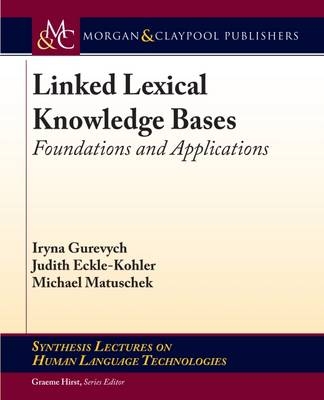
Linked Lexical Knowledge Bases
Morgan and Claypool Life Sciences (Verlag)
978-1-62705-974-9 (ISBN)
This book conveys the fundamentals of Linked Lexical Knowledge Bases (LLKB) and sheds light on their different aspects from various perspectives, focusing on their construction and use in natural language processing (NLP). It characterizes a wide range of both expert-based and collaboratively constructed lexical knowledge bases. Only basic familiarity with NLP is required and this book has been written for both students and researchers in NLP and related fields who are interested in knowledge-based approaches to language analysis and their applications.
Lexical Knowledge Bases (LKBs) are indispensable in many areas of natural language processing, as they encode human knowledge of language in machine readable form, and as such, they are required as a reference when machines attempt to interpret natural language in accordance with human perception. In recent years, numerous research efforts have led to the insight that to make the best use of available knowledge, the orchestrated exploitation of different LKBs is necessary. This allows us to not only extend the range of covered words and senses, but also gives us the opportunity to obtain a richer knowledge representation when a particular meaning of a word is covered in more than one resource. Examples where such an orchestrated usage of LKBs proved beneficial include word sense disambiguation, semantic role labeling, semantic parsing, and text classification.
This book presents different kinds of automatic, manual, and collaborative linkings between LKBs. A special chapter is devoted to the linking algorithms employing text-based, graph-based, and joint modeling methods. Following this, it presents a set of higher-level NLP tasks and algorithms, effectively utilizing the knowledge in LLKBs. Among them, you will find advanced methods, e.g., distant supervision, or continuous vector space models of knowledge bases (KB), that have become widely used at the time of this book's writing. Finally, multilingual applications of LLKB's, such as cross-lingual semantic relatedness and computer-aided translation are discussed, as well as tools and interfaces for exploring LLKBs, followed by conclusions and future research directions.
Iryna Gurevych is Full Professor and Director of the Ubiquitous Knowledge Processing (UKP) Lab in the Department of Computer Science at the Technische Universitat Darmstadt. In addition, she leads the Graduate School "Adaptive Information Preparation from Heterogeneous Sources" (AIPHES). Within NLP, Iryna's research focus is on text understanding and lexical semantics, argumentation analysis, and novel applications of text analysis in social sciences and humanities. Iryna has led the development of UBY, a large-scale sense-linked lexicalsemantic resource for English and German. She has published on using this resource to enhance various natural language processing tasks, such as word sense disambiguation, text classification, or information search, and has done significant research on semantic relatedness and semantic similarity of words, short texts, or longer documents.|Judith Eckle-Kohler is currently a postdoctoral researcher at the Ubiquitous Knowledge Processing (UKP) Lab in the Department of Computer Science at the Technische Universitat Darmstadt. She obtained her doctoral degree in Computational Linguistics in 1999 from the University of Stuttgart, Germany. She also holds a Diploma in Computer Science (University of Stuttgart, 1995). Her current research interests are knowledge-based machine learning and large-scale knowledge acquisition from text. Within the UBY project, she has been leading the creation of the uniform data model UBY-LMF, and developed distant supervision methods based on UBY for the tasks of verb sense disambiguation and semantic role labeling.|Michael Matuschek is currently working as a software engineer and consultant in Munich, Germany. Before that, he was a researcher at the Ubiquitous Knowledge Processing (UKP) Lab in the Department of Computer Science at the Technische Universitat Darmstadt, where he also received his doctoral degree in Computer Science in 2014. The main topic of his academic research work was the automatic linking of lexical resources in the course of the UBY project, with a particular interest in collaboratively constructed ones. Nowadays his work is more focused on practical implementations of NLP, for instance in business intelligence applications and human computer interaction.
Table of Contents: Foreword / Preface / Acknowledgments / Lexical Knowledge Bases / Linked Lexical Knowledge Bases / Linking Algorithms / Fundamental Disambiguation Methods / Advanced Disambiguation Methods / Multilingual Applications / Interfaces and Tools / Conclusion and Outlook / Acronyms / Bibliography / Authors' Biographies
| Erscheinungsdatum | 06.08.2016 |
|---|---|
| Reihe/Serie | Synthesis Lectures on Human Language Technologies |
| Verlagsort | San Rafael, CA |
| Sprache | englisch |
| Maße | 191 x 235 mm |
| Gewicht | 525 g |
| Themenwelt | Mathematik / Informatik ► Informatik ► Datenbanken |
| Informatik ► Theorie / Studium ► Künstliche Intelligenz / Robotik | |
| Informatik ► Weitere Themen ► Hardware | |
| Sozialwissenschaften ► Kommunikation / Medien ► Buchhandel / Bibliothekswesen | |
| ISBN-10 | 1-62705-974-1 / 1627059741 |
| ISBN-13 | 978-1-62705-974-9 / 9781627059749 |
| Zustand | Neuware |
| Informationen gemäß Produktsicherheitsverordnung (GPSR) | |
| Haben Sie eine Frage zum Produkt? |
aus dem Bereich


